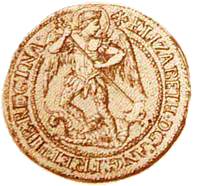Shakespeare's income
Unlike many artists, Shakespeare enjoyed prosperity during his own lifetime. It is impossible to calculate his income with any certainty, although as playwright, sharer in the Lord Chamberlain's company, and partner in the Globe and Blackfriars theaters, he probably made about £200 annually at the height of his career.
Shakespeare invested* his money effectively, purchasing several properties in and around Stratford, including a major investment in farm revenues. Here is the record that shows "William Shakespere Lykewise holdeth one cottage and one garden by estimation a quarter of one acre and payeth rent yearly ijs vjd."
Public Record Office, E. 179/146/354. Crown copyright.
This document may be copied and downloaded for personal and
research use only. You must apply to the Public Record Office
for any other use.
He also owned a London rental property*. Apparently he was gaining a reputation for having money, since one of his neighbours wrote a letter asking for a loan of thirty pounds -- but never sent it. It is the only surviving letter written to Shakespeare.
Footnotes
-
Financial records
There are a surprising number of surviving financial records concerning Shakespeare. He avoided -- or forgot to pay -- taxes, and took legal action to force payment of outstanding debts.
-
Rents and legal fictions
The property had three "trustees," though Shakespeare owned it. David Kathman explains:
Shakespeare owned the whole thing, but for complicated legal reasons, he had three trustees (William Johnson, John Jackson, and John Heminges) listed in the conveyance and mortgage. Their apparent co-ownership was a legal fiction: Shakespeare paid all the money, and the property passed on to his heirs at his death.

